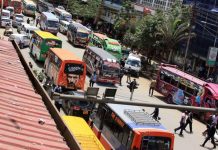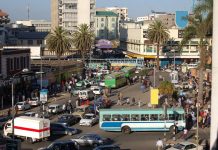•From January, 1 2021, only 2014 manufactured vehicles will be allowed into the country under the eight-year age limit rule.
•Importers have requested for an extension for 2013 units until March 202. A lock-out could see KRA miss up to ShSh30 billion in excise duty.
More than 30,000 second-hand cars could be locked out of Kenya come December 31, as vessel scarcity continues to increase.
Apart from occasioning loss dealers and individual car importers, the Kenya Revenue Authority(KRA) risks loosing up to Sh30 billion in excise duty.
On average, it collects Sh250,000 or higher, per unit of a second-hand car that lands at the Port of Mombasa.
The Car Importers Association of Kenya(CIAK) yesterday said units ordered in September, October and November are among those that are yet to secure bills of lading, meaning they are still yet to be processed for shipment.
This is due to vessel scarcity in key import sources of Japan (which accounts for 80 per cent of second–hand units coming into the country), Europe and other key markets of United Arab Emirates,Singapore and South Africa.
A bill of lading in shipping is a record of the traded goods which have been received on board. It indicates a particular carrier through which the goods have been placed and the conditions for transporting the shipment to its final destination.
Dealers and individual importers have 23 days, to ensure their units have landed at the Port of Mombasa or get locked out.
This is under the government’s age limit policy, which restricts importation of vehicles that are more than eight years old from the year of manufacture.
A number of shipping lines, among them two from the UK, have written to the Kenya Bureau of Standards (Kebs), informing the agency of canceled voyages to the region amid lock-downs in countries they sail before docking at Mombasa.
The shipping lines have also reported Covid cases in some of their vessels which has seen crew sent on quarantine hence cannot sail.
“People had paid deposit for these units. The cancellation of vessels and availability challenges is a big disruption. We are afraid units ordered as early as September will not make it on time,” CIAK Mombasa chapter chairman Mustafa Ramadhan told the Star yesterday.
He said importers risk loosing billions of shillings if the units are locked-out, calling on the Trade Ministry and Kebs to allow an extension up to March 2021.
“This are unprecedented times where nobody expected the pandemic. In a worse case we are going to have more than 30,000 units not making it on time and that is why we are seeking an extension,” he said in a telephone interview.
There are at least five vessels in the high seas shipping units to Kenya, expected to dock between Friday and December 21–KPA data.
Shipping transit times between Japan and Mombasa are between 26 to 30 days, while sailing from Europe can take between 20 and 40 days depending on the departure and destination ports as most vessels call at a number of other ports on their way to Kenya.
This means any vehicle or cargo loaded in these points of origin today will not make it to Mombasa before the deadline.
The Kenya National Chamber of Commerce and Industry (KNCCI) has since called on the government to cushion importers during the pandemic period.
“It is a plea to the government, we all see what the pandemic has done to the global and local economy, businesses need support at this time,” KNCCI Mombasa chapter CEO James Kitavi said.
On average, Kenya imports 7,000 to 10,000 units of used-cars a month with an annual import bill of Sh60 billion, a major contributor to KRA revenues thorugh excise duty, VAT and Import Declaration Fee.
Other beneficiaries are NTSA which gets between Sh6,000 and Sh22,000 for registration, depending on engine capacity, and Kebs which collects 10-20 per cent of $220 (about Sh24,500) charged per unit in pre-shipment inspection by its agents.
The last time a major hiccup was witnessed was in 2014 when more than 2,000 units registered in 2006 were locked out of the country after arriving later than December 31, leading to losses of billions by dealers, individual importers and missed revenues by the taxman.
More than 80 per cent of cars on the Kenyan roads are refurbished used-second hand imports.
SOURCE: https://www.the-star.co.ke/business/kenya/2020-12-10-more-than-30000-used-cars-risk-being-locked-out-importers/







![Top 20 Used Cars to Avoid Buying in Kenya – [PHOTOS]](../../../blog/wp-content/uploads/2013/11/top-used-unreliable-cars-to-avoid2-80x60.jpg)


![Here are some of the best tuned cars in kenya by state of the art garages [PHOTOS]](../../../blog/wp-content/uploads/2013/11/29402_10151301757042065_340470732_n-e1384498044289.jpg)
![Top 20 Used Cars to Avoid Buying in Kenya – [PHOTOS]](../../../blog/wp-content/uploads/2013/11/top-used-unreliable-cars-to-avoid2-100x70.jpg)





